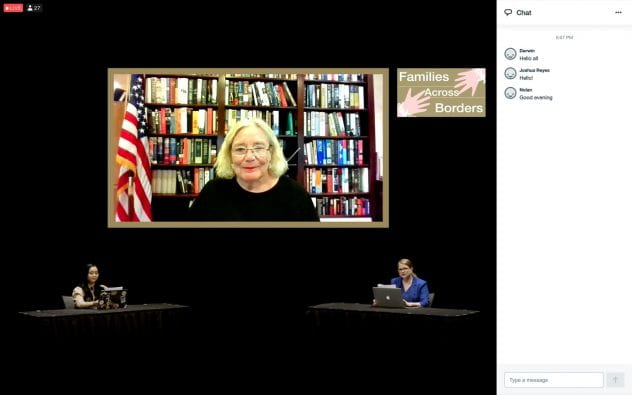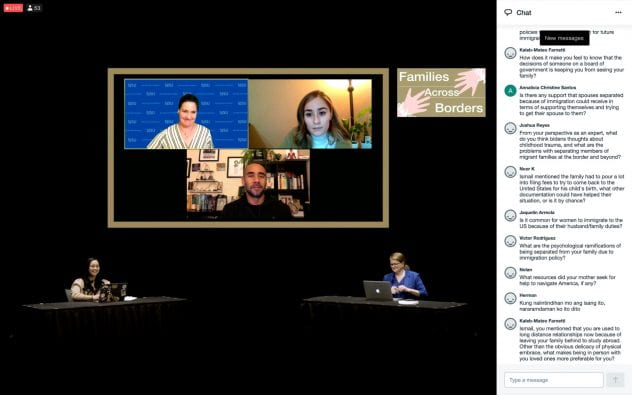San José State University’s School of Journalism and Mass Communications tackled hard questions about the impact of immigration policies on families at Families Across Borders: A Live Connection, a global virtual event, live-streamed from SJSU’s Hammer Theatre on March 23. U.S. Congresswoman Zoe Lofgren kicked off the evening with introductory remarks about her commitment to immigration reform from her office in Washington D.C.
The event was emceed by SJSU Journalism and Mass Communication Professor Diane Guerrazzi and Joronica Vinluan, ’21 Journalism, onstage at the Hammer. Five alumnae reporters presented multimedia presentations on families from Mexico, Morocco and the Philippines about the social and psychological effects of family separation.

U.S. Congresswoman Zoe Lofgren (center) spoke at the Families Across Borders event, streamed from the Hammer Theatre on March 23. Joronica Vinluan, ’21 Journalism (left), and SJSU Professor of Journalism and Mass Communications Diane Guerrazzi (right) anchored the evening. Photo by Bob Bain.
“The basic structure of immigration law has been unchanged, for the most part, since 1965,” said Lofgren, former immigration attorney and chair of Congress’ Subcommittee on Immigration and Citizenship.
She recalled hosting her first hearing on immigration on Ellis Island in 2007, where she shared the story of her Swedish grandfather, then an unaccompanied minor, who had immigrated to the U.S. in search of a better life.
“I did that to remind all of us that immigration is really central to our core as Americans,” she said. “The optimism, the courage, the bravery, the value of family, the American dream that immigrants embody and their ancestors embodied is as true today for the immigrants coming to America as it was 100 or 200 years ago.”
As the co-author of the new Farm Workforce Modernization Act, which offers opportunities for farmworkers, their spouses and children to earn legal status through continued employment in agriculture, Lofgren remains hopeful that humane immigration reform is possible. She also mentioned that the American Dream and Promise Act of 2021 would provide a pathway to citizenship for undocumented immigrants.
The House of Representatives passed both bills last week.
Spartan journalists share stories of separation
After Lofrgren’s remarks, Guerrazzi and Vinluan introduced alumnae reporters who shared stories live on Vimeo.
Spartan journalist Elizabeth Rodriguez shared the story of David, whose mother returned to her native Mexico to see her dying father and whose father was deported. Left without his parents in northern California, David had to help raise his siblings.
While David reflected on the challenges of long-term family separation, Spartan reporter Guadalupe Emigdio, ’20 Communication Studies, shared the story of Hector, who fled violence while immigrating from Mexico. Emigdio translated his responses about the “ugly, sad feelings” that linger when thinks of the miles keeping him from his parents.
Both David and Hector connected to the livestream to field questions from the reporters.
Kelsey Valle, ’20 Journalism, now an assignment editor at Telemundo 48 Bay Area, produced a story about Kelsea and Ismail, a married couple and parents to an almost 1-year-old daughter. Both Spartans, the couple met at SJSU’s International House and were married in Morocco, Ismail’s home country, in 2019.
Despite this, immigration laws and COVID-19 restrictions have kept them in different countries, even through the birth of their daughter. Kelsea connected from Turlock and Ismail from Morocco to share how they long to be together as a family once more.
Nicole Albillar, ’20 Global Studies, interviewed a same-sex couple whose civil union was not recognized by federal immigration laws for years before they were allowed to live permanently in the same country. While Judy and Karin are thrilled to finally make a home together in San José, the years of travel back and forth took a toll.
“It’s like a knife to the heart when you hear about families being separated, regardless of the reason,” said Judy live at the event. “But when it’s the government that’s making you not be able to be together, it’s more heartless.”
Humanizing immigrant narratives
The final piece was produced by Vinluan, the daughter of Filipino immigrants who have been separated from their family members for more than 15 years. Vinluan interviewed her mother Akilah, who lives in San José, and her aunt Maria Teresa, who lives in the Philippines, to answer questions about the impact of their separation.
“When people think of immigration, they tend to think in two ways: politics or family,” said Vinluan. “I want to emphasize the humanity of immigration. If you take the time to understand different cultures, there can be new connections, especially between generations.”

Joronica Vinluan, ’21 Journalism, (left) and SJSU Professor of Journalism and Mass Communications Diane Guerrazzi (right) anchored Families Across Borders, a live event streamed from SJSU’s Hammer Theatre on March 23. The evening included a panel of experts: SJSU Psychology Lecturer Jill Citron (upper left), Human Rights Institute Director William Armaline (center) and associate clinical social worker Yovanna Moran. Photo by Bob Bain.
The event concluded with a panel discussion with William Armaline, director of SJSU’s Human Rights Program; Jill Citron, psychology lecturer; and Yovanna Moran, associate clinical social worker in Stanislaus County. Online viewers shared questions about the effects of family separation, which sometimes include post-traumatic stress disorder, attachment disorders and difficulty trusting others.
The Families Across Borders event was an extension of ongoing immigration reporting done by San José State’s Update News, the weekly student news broadcast, said Guerrazzi. In 2018 and 2019, she taught summer journalism courses in Italy and Greece, where SJSU students reported on the refugee crisis.
The resulting award-winning special, Beyond Borders: Refugee Realities, covered stories from Italy, Greece, Mexico, Vietnam and the Philippines. A second Update News Refugee Realities special that examines efforts to house children and place families in American communities will air in May. A Families Across Borders podcast to highlight immigrant narratives is also in the works.
